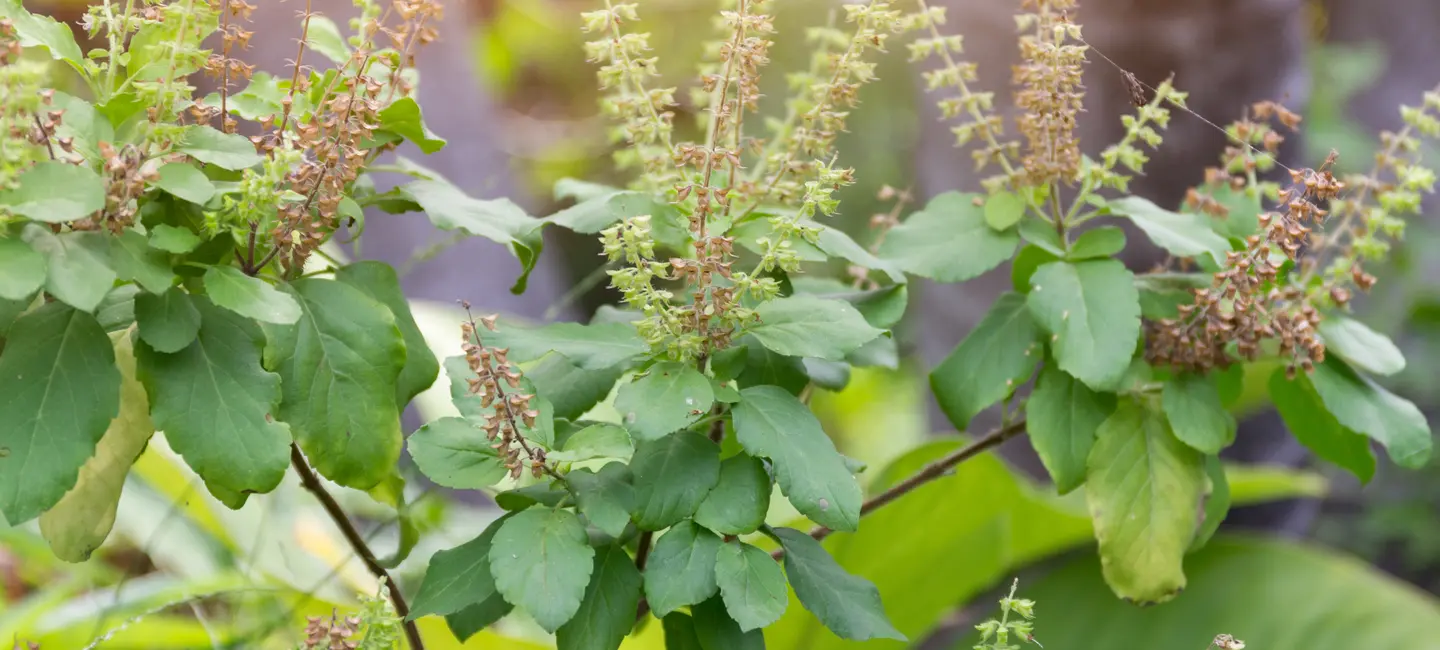
Holy basil (Ocimum tenuiflorum) is a plant that is native to India. It is commonly used in the traditional Indian medicine system, Ayurveda.
Holy basil is sometimes called "hot basil" because of its peppery taste. Chemicals in holy basil are thought to decrease pain and swelling. They also might lower blood sugar in people with diabetes. Holy basil oil might act as an antioxidant.
People use holy basil for anxiety, stress, diabetes, high cholesterol, and many other conditions, but there is no good scientific evidence to support any of these uses.
Don't confuse holy basil (Ocimum tenuiflorum) with basil (Ocimum basilicum), which is very commonly used in cooking.
Is It Effective?
There is interest in using holy basil for a number of purposes, but there isn't enough reliable information to say whether it might be helpful.
Is it Safe?
When taken by mouth: Holy basil is possibly safe when used short-term. Holy basil leaf extract has been safely used at a dose of 500 mg daily for 60-90 days. Taking holy basil might cause nausea or diarrhea. There isn't enough reliable information available to know if it is safe to use long-term.
When applied to the skin: Holy basil is possibly safe when used as a mouthwash, short-term.
Special Precautions & Warnings:
Pregnancy: Holy basil is possibly unsafe when taken during pregnancy or when trying to become pregnant. In animals, large doses of holy basil seem to reduce the chance of getting pregnant or having a full-length pregnancy. It is not known if this happens in humans. Stay on the safe side and avoid using.
Breast-feeding: There isn't enough reliable information to know if holy basil is safe to use during breast-feeding. Stay on the safe side and avoid use.
Hypothyroidism: People with hypothyroidism have low levels of the thyroid hormone called thyroxine. Holy basil might lower thyroxine levels. In theory, this could worsen hypothyroidism.
Surgery: Holy basil might slow blood clotting, so there is a concern that it could increase the risk of bleeding during and after surgery. Stop using holy basil at least 2 weeks before a scheduled surgery.
Medications for diabetes (Antidiabetes drugs)
Interaction Rating=Moderate Be cautious with this combination.
Holy basil might lower blood sugar levels. Taking holy basil along with diabetes medications might cause blood sugar to drop too low. Monitor your blood sugar closely.
Medications that slow blood clotting (Anticoagulant / Antiplatelet drugs)
Interaction Rating=Moderate Be cautious with this combination.
Holy basil might slow blood clotting. Taking holy basil along with medications that also slow blood clotting might increase the risk of bruising and bleeding.
Pentobarbital (Nembutal)
Interaction Rating=Moderate Be cautious with this combination.
Pentobarbital causes drowsiness. There is some concern that taking holy basil seed oil with pentobarbital might cause too much drowsiness. But there isn't enough information to know if this is a big concern.
Herbs and supplements that might lower blood sugar: Holy basil might lower blood sugar. Taking it with other supplements with similar effects might lower blood sugar too much. Examples of supplements with this effect include aloe, bitter melon, cassia cinnamon, chromium, and prickly pear cactus.
Herbs and supplements that might slow blood clotting: Holy basil might slow blood clotting and increase the risk of bleeding. Taking it with other supplements with similar effects might increase the risk of bleeding in some people. Examples of supplements with this effect include garlic, ginger, ginkgo, nattokinase, and Panax ginseng.
There are no known interactions with foods.
Holy basil has most often been used by adults in doses of 500 mg daily, for 1.5-3 months. A 4% holy basil leaf extract mouthwash has also been used twice daily for 30 days. Speak with a healthcare provider to find out what dose or product might be best for a specific condition.
Ajaka, Albahaca Santa, Bai Gkaprow, Baranda, Basilic Indien, Basilic Sacré, Basilic Sacré Pourpre, Basilic Saint, Brinda, Green Holy Basil, Hot Basil, Indian Basil, Kala Tulsi, Kemangen, Krishna Tulasi, Krishna Tulsi, Manjari, Ocimum sanctum, Ocimum tenuiflorum, Parnasa, Patrapuspha, Rama Tulsi, Red Holy Basil, Sacred Basil, Sacred Purple Basil, Shyama Tulsi, Sri Tulasi, Suvasa Tulasi, Tulasi, Tulsi, Tulsi Patra.
Information on this website is for informational use only and is not intended to replace professional medical advice, diagnosis, or treatment. While evidence-based, it is not guaranteed to be error-free and is not intended to meet any particular user’s needs or requirements or to cover all possible uses, safety concerns, interactions, outcomes, or adverse effects. Always check with your doctor or other medical professional before making healthcare decisions (including taking any medication) and do not delay or disregard seeking medical advice or treatment based on any information displayed on this website.
© TRC Healthcare 2024. All rights reserved. Use and/or distribution is permitted only pursuant to a valid license or other permission from TRC Healthcare.
